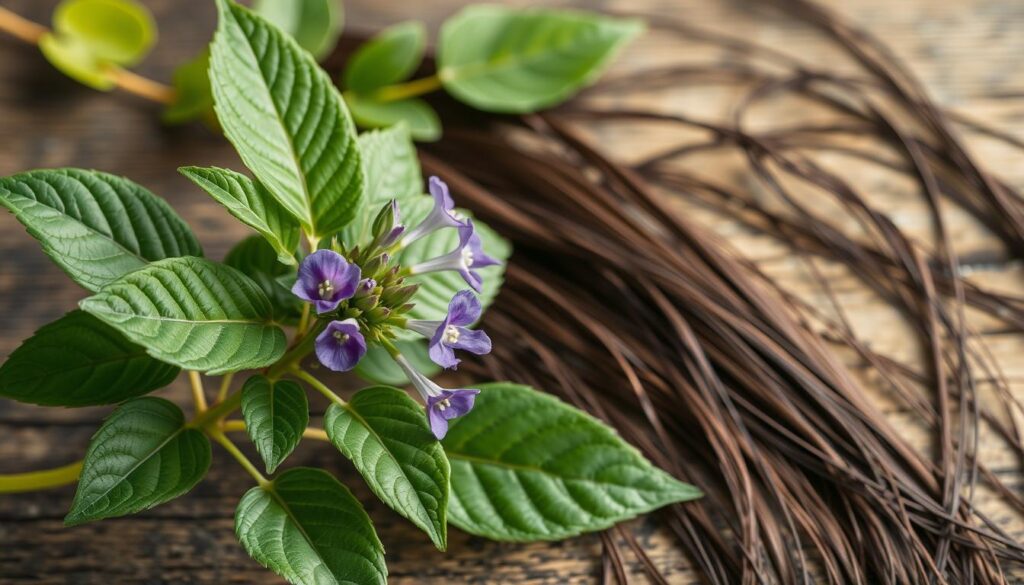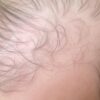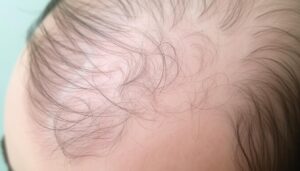Ashwagandha has become popular for its health benefits. But, does it cause hair loss? We’ll look into the truth about ashwagandha and hair health. This will help you decide if it’s right for you.

Key Takeaways
- Ashwagandha is a popular Ayurvedic herb known for its potential health benefits.
- Some people have raised concerns about ashwagandha’s potential link to hair loss.
- This article will explore the relationship between ashwagandha and hair loss, separating fact from fiction.
- Readers will gain a deeper understanding of the potential effects of ashwagandha on hair health.
- Solution for hair loss: Scalp Micropigmentation
Understanding Ashwagandha and Its Potential Effects on Hair
Ashwagandha is a well-known herb in Ayurvedic medicine. It’s known for its health benefits. But, its effect on hair growth or loss is still being studied.
What is Ashwagandha?
Ashwagandha, or Withania somnifera, comes from India and North Africa. It’s used in Ayurvedic medicine to improve health, reduce stress, and enhance brain function. The roots and leaves are mainly used for medicine.
Ashwagandha’s Traditional Uses and Potential Benefits
In Ayurvedic medicine, ashwagandha is seen as an adaptogen. It helps the body handle stress. It may also:
- Reduce stress and anxiety
- Improve sleep
- Boost brain function and memory
- Enhance athletic performance
- Control blood sugar
- Lessen inflammation
Some believe ashwagandha can help with ashwagandha for hair growth and ashwagandha benefits for hair. But, there’s not enough research to prove this. More studies are needed.
Does Ashwagandha Cause Hair Loss?
Exploring the Relationship Between Ashwagandha and Hair Loss
Can ashwagandha cause hair loss? Many people worry that ashwagandha might cause hair loss. Some studies hint that it could affect dihydrotestosterone (DHT), a hormone linked to hair loss. But, the research is still mixed, and we need more studies to know for sure.
Hair loss can be caused by many things, not just ashwagandha. Genetics, stress, hormonal issues, and health problems can also play a part. So, it’s important to look at the big picture before blaming ashwagandha for hair loss.
Some people say ashwagandha makes their hair fall out more, but the science isn’t clear. Yet, some studies suggest it might help promote hair growth and reduce hair loss. This is because of its antioxidant and adaptogenic properties.
The link between ashwagandha and hair loss is complex. We need more research to understand its effects. If you’re worried about hair loss, talk to a healthcare professional. They can help you find the best way to take care of your hair.
Factors That Contribute to Hair Loss
Hair loss can be caused by many things, not just ashwagandha. It’s key to know all the factors when looking into does ashwagandha cause hair loss.
Genetics play a big role in hair loss. Some people are more likely to lose hair because of their genes. This is true even if they don’t take ashwagandha or other supplements.
Hormonal changes can also lead to hair loss. Issues like thyroid problems or changes in androgen levels can affect hair. Medical conditions, scalp infections, or autoimmune diseases can make hair loss worse. Some medicines, like those used in chemotherapy, can harm hair health.
Stress is another big factor in hair loss. Too much stress can make hair fall out or become thinner. Poor diet, not enough sleep, and too much styling or chemical treatments can also harm hair growth.
When looking into does ashwagandha cause hair loss, it’s important to consider all possible causes. Talking to a healthcare professional can help find the real reason for hair loss. They can then suggest the best treatment.
Knowing all the factors that lead to hair loss helps in finding the right solution. This ensures effective and personalized treatments for everyone.
Conclusion
The link between ashwagandha and hair loss is complex. Some studies hint that ashwagandha might affect hormones linked to hair loss. But, the research is still limited and not clear-cut.
If you are experiencing hair loss, you should consider scalp micropigmentation. A non-invasive procedure that can make you hair look fuller and help you gain your confidence back.
Come visit us at ScalpMasters to start your journey with SMP. Contact us today to schedule a consultation!










